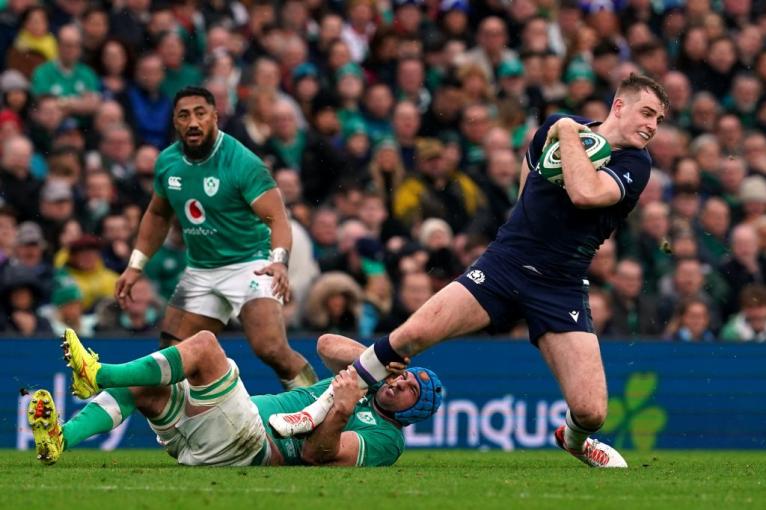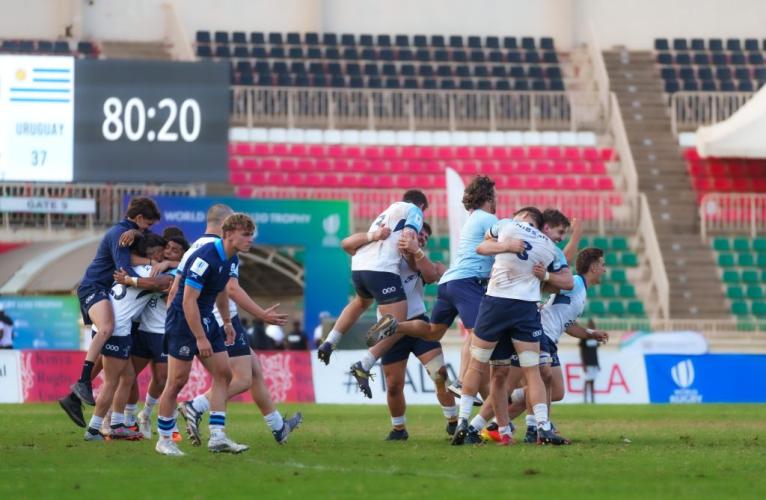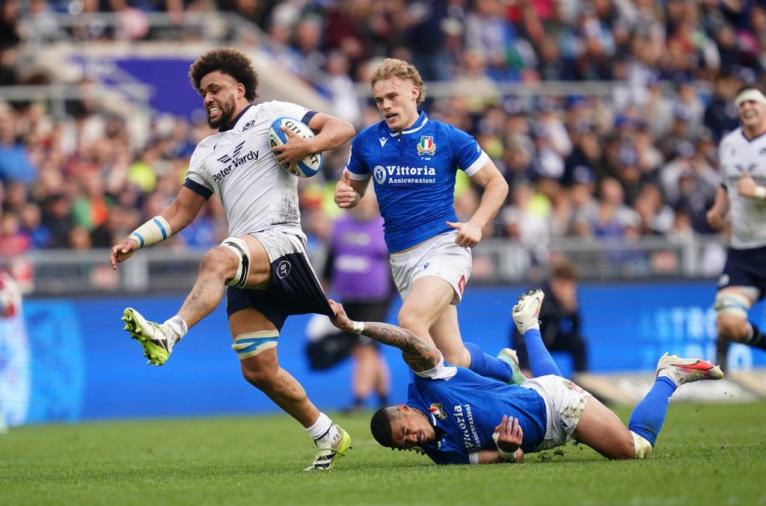In these turbulent times of soaring interest rates and photoshopped princesses, Scotland’s maddening propensity to combust when you least expect it, just when you think they’re past the stage of howler performances, rollercoaster championships and mass head loss remains as steadfast as ever. The search for the Holy Grail is nothing in comparison to the Scottish quest for consistency. Until they find it, this vaunted crop will be doomed to exist in perpetual frustration.
Scotland began their Six Nations by collapsing spectacularly against the most callow Wales team in eons. They escaped Cardiff with a win – rare enough over the past few decades – but palpitations induced by seeing a 27-0 half-time advantage frittered to a single point by the end.
They didn’t build the score their dominance merited against France, then couldn’t convert their final attack with the clock red. Whatever the TMO said about Sam Skinner and the try line, you can’t leave championship matches in the hands of officials.

They beat England handily, scoring three wonderful, collector’s item tries. Then they torpedoed their own momentum by chucking a 12-point lead against Italy, playing fast and loose and frenetic and blundering into all the traps the Azzurri laid out for them. They had kicked more ball than anybody else and yet in Rome, ran and ran and then ran some more. Their discipline utterly deserted them, at one stage shipping seven penalties on the bounce and against a fearless team emboldened by the Stadio Olimpico fervour, and failed to wrest back the impetus.
Scotland should have been chasing a Slam on Super Saturday, four wins from four with 18 points gathered. That’s where they were supposed to be, where they believed they could be. A shot at their white – or should that be green? – whale with the ultimate prize on the line. They weren’t in that position because they can’t escape the sheer changeability in their performance levels, both within games and from one to the next.
Scotland defended magnificently against Ireland, but even trailing by three points heading into the final 20, you never had the sense they could seize an opportunity to smite the one Six Nations foe Gregor Townsend has never conquered.
There was nothing besides hope to suggest Scotland would arrest that streak on Saturday and with so little possession, and so many errors, Townsend’s painful wait for victory over the Irish stretches on.
The Scottish pack will resemble the contents of an old fruit bowl today. They posted some eye-watering tackle counts. The front-row made 54 shots between them. Zander Fagerson contributed 22 alone from tighthead prop. Scott Cummings made 25, Andy Christie 28, Jack Dempsey 20. None of the starting pack were below 12.
Ireland’s centres, Bundee Aki and Robbie Henshaw, made three times as many carries as the Scottish pair of Stafford McDowall and Huw Jones, who embarked on just nine runs between them.
When they had the ball, Scotland struggled to keep it. A mountain of 20 handling errors brutally limited their ability to build pressure and ask questions of the champions. When Jones scythed through to score a peach late on, it would have taken a multi-phase, long-range epic to snatch the game. Scotland didn’t look like they had that precision in them.
It’s ten defeats in a row now against Ireland, only once scoring more than 20 points, with an average losing margin of 14. There was nothing besides hope to suggest Scotland would arrest that streak on Saturday and with so little possession, and so many errors, Townsend’s painful wait for victory over the Irish stretches on. Groundhog Day in Dublin.
Scottish Rugby has bigger problems to solve than the bonkers fluctuations of its flagship team. Its Under-20s endured another winless campaign, finishing with a solitary bonus point and a points difference of -105 after leaking 26 tries. In the past four tournaments, Scotland have been whitewashed three times and won a single match. They were relegated from World Rugby’s top-tier U20 Championship to the Trophy competition and could not win back their spot last summer, losing to Uruguay.

It’s easy to look at this litany of failure and conclude there’s no quality emerging from the national pathways. That isn’t true. There is fine young talent in the current age-grade side, as there was in the lean years before. It is just not conditioned or prepared or readied to mix it on the international stage.
Only one Scottish player from Friday night’s loss to Ireland had a single morsel of professional rugby: Ruaridh Hart, four minutes off the bench for Glasgow last month in a routine hosing of the Dragons.
That’s a recurring theme. Too many capable youngsters aren’t playing rugby at a high enough standard to hasten their development. Often, these players need a slew of injuries to be given their chance in the URC. The two Scottish pro-teams are well resourced, have internationals at their fingertips and coaches under pressure to deliver results to match their spend. The URC no longer holds fixtures during international windows, meaning the top dogs miss fewer games.
Word is, there will be some trimming of the fat at both clubs next season and a renewed focus on Scottish-qualified players. These young men, particularly those in the 20-23 age bracket, need regular, quality rugby if they’re going to grow as quickly as they should, and eventually blossom into Test-ready competitors. If they’re not getting it in Scotland, then the SRU will need to find creative solutions elsewhere.
That’s the enormous issue the union is now grappling to solve. The SuperSeries, launched in 2019 to bridge the gap between the domestic and professional ranks, is being scrapped this year. We don’t know what will replace it, but we do know the previous setup was widely written off as not fit for purpose.
Scotland struggle to compete against nations whose own domestic systems are far better oiled and give their rivals a huge leg up.
For an hour this weekend, Scotland’s tyros defended heroically against an Irish team chasing a third straight U20s Slam. They offered little with the ball but without it, they levelled carriers, dynamited rucks, stole possession and, compellingly, dismantled the home scrum. Ireland’s first four visits to the Scottish 22 ended with Scotland turning them over. There are players in this team worth getting excited about. But inevitably, 60 minutes of near-all-out defence took its toll and Scotland were pulled apart to the tune of 36-0.
Scotland struggle to compete against nations whose own domestic systems are far better oiled and give their rivals a huge leg up. It isn’t necessarily professional exposure. Ireland’s U20s mightn’t be playing URC rugby each week – in fact virtually none of them have many minutes in the league – but plenty have been churned out of moneyed private schools so sophisticated they almost mirror professional environments. The schools game is thriving, the provinces play competitive A fixtures and below that, the AIL is a sound domestic league. Standards are high, pressure and professionalism are everywhere.
Wales have been forced to blood kids this spring with predictable results. Though by grim circumstance rather than canny planning, their young players are being exposed to the rarified Six Nations air. The financial strife and rancour which has chewed up Welsh rugby will at least provide URC minutes to the fresher faces. Over the past two months, Warren Gatland will have learned a lot about what he has to work with this cycle.
England have a vast player pool, cash at the hip and a slew of club academies. The Championship has, to some extent, been abandoned by the RFU but it remains a formidable proving ground.
France, likewise, are wealthy in resource and player numbers. The vibrant ProD2 is the envy of the rugby world. Their U20s are playing professional rugby, and lots of it. Of the XV which took on England on Friday, all but two have featured in the Top 14 or ProD2. They had a combined haul of over 200 professional matches. The gigantic Posolo Tuilagi already has three full international caps. Full-back Mathis Ferte has over 40 appearances for Brive, fly-half Hugo Reus 22 for European champions La Rochelle, back-row Marko Gazzotti 23 between Grenoble and swashbuckling Bordeaux-Begles. A few others are earning game time with storied Toulouse and Racing 92.
You can’t compare Scotland and France as rugby nations, but you can put better structures in place to compete with the heavyweights. Look at Italy. Like Scotland, they have a modest rump of players. Like Scotland, they have only two professional teams. And like Scotland, they have long supplemented their home-reared crop with overseas recruits. Why, then, are they pulling up trees, claiming scalps and bringing players through when Scotland are not? The Italian senior side which stunned Scotland in Rome, were a toppled ball from beating France and swept Wales away in Cardiff have a tantalising age profile and are bringing fresh talent into their group each year.
The Garbisi boys, Tommaso Menoncello, Lorenzo Cannone, Lorenzo Pani, Michele Lamaro himself and heaps more beside are the product of the FIR getting its house in order in a seriously impressive way.
Their U20s were serial losers not long before Scotland began their decline. They didn’t win a game for three years in 2016, 2017 and 2018. Yet in 2024, they stuck close to 50 points on Scotland, beat France in France, and were a point off sinking Ireland. Incredibly, Italy beat South Africa last year, having won three Six Nations matches.

Stephen Aboud, who oversaw much of the domestic restructuring and streamlining of academies, gave RugbyPass this telling analogy about winemakers and wine drinkers.
“If you’re busy drinking wine and not making it, you’re going to run out of bottles.
“Then you’ll have to find your bottles from some other source and not your own vineyard. That’s going to cost more, and you might not even like it.
“Ultimately when you’re finished drinking it, you’re still left with no wine.”
Scotland are ploughing through their wine stores but what will be left on the shelf when the current vintage runs dry? Will the SRU seek more grapes from England, South Africa and New Zealand?
Townsend is well aware of the problem. “We need to get our young Scottish players through in more numbers and quicker,” he said in July. “We have to do things differently to what we are doing.”
Their finger still hovers above the self-destruct button and you never quite know when they’re going to spam it.
We should see more of the kids on a mammoth summer tour of the Americas, featuring Tests against Canada, USA, Chile and Uruguay. Euan Ferrie, Alex Samuel and Max Williamson have won opportunities at Glasgow and each is a good bet for an international debut come July.
Scotland are light years from the doldrums of the past, days when tries were scarcer than wild haggis and you had as much chance of spotting Nessie as seeing Scotland contend for a Six Nations title.
Townsend has taken the platform built by Vern Cotter and moved Scotland on further again. We talk about them differently. We expect more from them. We marvel at the stuff they can conjure when they’re on their game and in their groove. We have seen hoodoos obliterated in England, Wales (twice) and France; a Calcutta Cup record which, if you’d posited four Scottish wins in a row even a decade previously, would have seen you whisked away by chaps in white coats.
Yet they’re still not a team you can hang your hat on. Their finger still hovers above the self-destruct button and you never quite know when they’re going to spam it. The worst part? They’re capable. So clearly, obviously capable. With the bulk of their squad in its prime years, and the angst about what’s coming through to replace them, it has to happen soon for these guys.
But Scotland are forever chasing the consistency that separates the good from the great, the potential from the tangible. The game’s elite simply don’t behave in this skittish manner. Scotland can’t be classed in that category until they follow suit.



Good article, I learnt quite a lot. A big sliding door moment was in the mid 00s when they rejected Steve Anderson's long term transformation and he wrote Ireland's strategy instead.
“a renewed focus on Scottish-qualified players”
Scottish-qualified is another way of saying English. England has development more players for the Scotland national Rugby team in the last 4 years, than Scotland has.